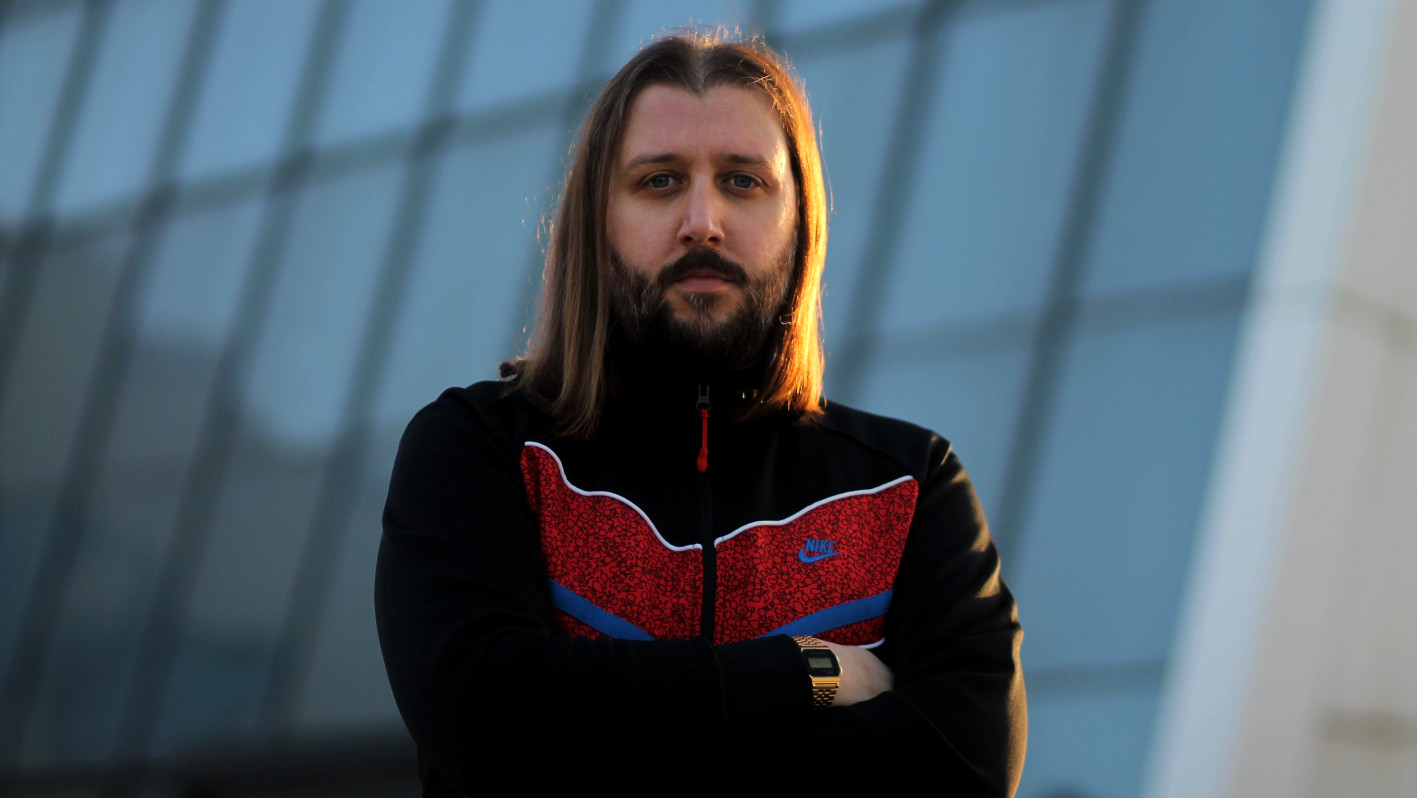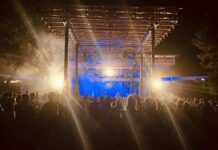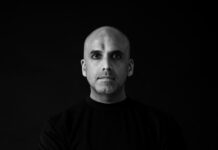Photo: Giulia Baroni (Koehler)
It only takes one look at Koehler’s discography to see that his music is near impossible to pigeonhole. Since 2013, the Bristol-born producer has released records on Skudge, Berceuse Heroique, Powell’s Diagonal, Oliver Hafenbauer’s Die Orakel and recently Whities – playgroundss for producers who like to move beyond conventional dance music tropes. And while the now Bologna-based Daniel Koehler also draws on the musical tradition of his home town, he seems to be less aiming for a signature sound than rather an attitude that can be conveyed through lush ambient pieces or gritty bangers alike. His contribution to our Groove podcast then is equally confrontative and challenging at the same time.
You grew up in Bristol, cite jungle and drum’n’bass as a main inspiration but have also played in an improv/psych band. How did you first get in touch with electronic music?
My first introduction to electronic music was through Drum’n’Bass rave tapes when I was around 11 or 12 years old, at the same time there was also the One In the Jungle show on BBC Radio 1 which then became Fabio and Grooverider’s show. Their show was on Friday nights I think, from 2am till 4am, and I remember that I used to go to sleep after school on a Friday and set an alarm so I would not miss the show. I remember I fell asleep before putting the alarm on once and I slept through the show, I was so upset with myself when I woke up the next morning! I wrote a letter to Radio 1 and a few weeks later they actually sent me a cassette of a recording of the show I missed. Can you imagine something like that happening today?! Also there were just so many record shops in Bristol back then, there was one in particular called Breakbeat Culture which was in the back room behind a clothes shop on Park Street. It smelled of mould and the DJs would be smoking and drinking in there, just hanging out. That place was so fucking cool! And there was another great one called Replay which used to be down by the Bristol bus station. I remember meeting Adam F in there who was one of my absolute heroes. After that I started to learn about music in general just by finding out who and what they sampled. So it was through Adam F and Photek’s music that I discovered who Miles Davis and Herbie Hancock were. I distinctly remember hearing „Sing Time“ by Ray Keith and thinking what on earth is that sound? Then I found out that he sampled some band I’d never heard of called Pink Floyd. (laughs) Was definitely a fun way to discover the world of music!
The guitar still plays a role in your music to this day. How do you make use of it in the studio?
I got a summer job washing dishes in a hotel when I was 16 to earn the money so I could buy myself a guitar and after taking a good few months working out how to tune it, I learnt to play by playing along to „Dark Star“ by the Grateful Dead – there are only 2 chords in it and its over 30 minutes long so you have plenty of time to get it right! Anyone who has been in a band knows how thrilling it can be when you are in the middle of a jam, and out of the chaos something truly magical occurs. Something that would be impossible to ever compose, getting three or four players all synchronising together, all reacting to each other, playing as if they know exactly what the other person is about to do. Moments like those are some of the best experiences I’ve ever had, not just in music but in life! Thrashing away in a basement, losing my hearing, slowly getting through a crate of beer for hours and hours and it all sounds absolutely bloody terrible, but who the hell cares because you’re all having a bloody great time anyway, right? And then suddenly without talking, something clicks and suddenly you are all on a mission, building something transcendental together. That is definitely something I’ve always tried to recreate in my electronic productions, that element of shocking surprise. But until now in my electronic productions, I have mainly used the guitar to write melodies or bass lines and then transfer them to synths or to achieve some bizarre sounds, whether it be scraping the strings or sampling a strangely tuned chord or getting some odd harmonic on a particular note with loads of feedback. I’ve tried to find a hundred different ways to use the guitar in the most unguitaristic way possible. But now I’ve finally decided to let it all out and I’m producing a series of tunes where the guitar will be the main focus. Currently I’m working on a track which is basically one enormous distorted guitar solo over a pounding 135bpm drum break. It’s definitely time to bring back the bloody sixties!
„I always have to have some kind of visual image in my head,“ you have said about your working process in an interview and in fact art in general seems to play a rather big role for you. What inspires you on a visual level?
Anything that gives me Stendhal syndrome is pretty inspiring! If art or music don’t give you heart palpitations then it’s not actually art, is it?!
After a brief time in Berlin, you have moved to Bologna in Italy, a country with a rich art history that in terms of club culture however cannot compare to the possibilities offered by a city like Berlin. Why did you move there?
Yes, I had a wild time living in Berlin for three years and definitely no city can compare to Berlin in terms of its clubbing opportunities. The truth is I absolutely love going out but I didn’t want it to become Pleasure Island in Pinocchio. It’s really important for me to pursue all my interests in life because there is just so much to learn and discover and so very little time! And as far as the scene in Bologna goes, they have the incredible Timeshift crew putting on parties here and trust me, the ravers go wilder here than almost any party I’ve been to in Berlin!
In a recent tweet, you said that 2018 was an „utterly dreadful year it was for music“. What did you find lacking in 2018?
Well I was half joking when I wrote that, but only half joking! The truth is there has been some genuinely great music released in 2018, but nothing that I have heard that I would call absolutely life changing. Music so shocking, so alien, so mesmerising that you immediately become its disciple until the day you die. I’m pretty sure we all could do with more music like that in our lives !
Your DJ mixes are usually stylistically quite diverse, and your contribution to our Groove podcast makes no exception. What was your idea behind it?
I dubbed this mix „Soundtrack for a Psychological Battle“ so there are plenty of moments of paranoia, aggression and intensity finally exploding in a burst of calm at the end when hopefully, the battle has been won.
Last but not least: Where can we see you behind the decks in the near future, and what are your plans as a producer?
I have two EPs scheduled for the first half of 2019, and as long as Zeus doesn’t strike me down, two more for the second half! I also have contributed a track to a very cool various artists project. All will be revealed soon! This is also the year in which I will finally complete my debut album which is seriously going to be something different! And DJing wise I am happy to say I will be back at Timeshift in Bologna on February 2nd alongside Mumdance and Shifted and another very special club soon!
Stream: Koehler – Groove Podcast 193
01. Koji Kondo – City in the Sky (Symphony No.5)
02. Ko-Ta – Comptine (Tikita)
03. Koehler – Below Andromeda (Dubplate)
04. Rodamaal – Fortune (Buzzin’ Fly)
05. Koehler – Intérieurs Anciens (Slick-Tech Mirrorplate Mix)(Dubplate)
06. Dean Grenier – Individuate (Omnidisc)
07. M. Acardipane – Trio (Adrenacrome)
08. Ø (Phase) – Module Overload (Cosmic Records)
09. Limit-Xperience – Primrose Pain (Orden Extatica)
10. Gantz – U Won’t Mind (Black Box)
11. Perry & Rhodan – The Beat Just Goes Straight On & On (Straight On & On & On & On & On Mix) (Rising High Records)
12. Majistrate – Step On (V.I.P) (Splash Recordings)
13. Marco Shuttle – The Vox Attitude (Farden Records)
14. Dj Cake – Sugar Baby (Trophy Records)
15. Dan Robbins – D.B.D (Chanting In The Dark) (Junior London)
16. Koehler – Winged (Dubplate)
17. Roine Stolt – Dissonata
18. Pierre Jean Croset – Dance Of The Colours (Ocora)


![[REWIND 2024]: Die 10 besten Compilations des Jahres](https://groove.de/wp-content/uploads/2024/12/0FAE8615-AE70-4400-9B47-A8C7C7BEA0E9-218x150.jpeg)


